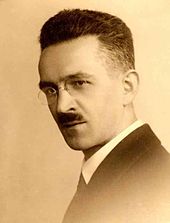Aleksander Birkenmajer
Aleksander Ludwik Birkenmajer (also: Alexander Ludwig Birkenmajer ; born July 8, 1890 in Czernichów near Cracow , Austria-Hungary ; died September 30, 1967 in Warsaw ) was a Polish science historian, philosopher and librarian. He worked as a professor at the Jagiellonian University and the University of Warsaw . As a member of the Polska Akademia Nauk , he encouraged the publication of the works of Nicolaus Copernicus and took part in their research and edition.
Life
He was the son of the astronomer and science historian Ludwik Antoni Birkenmajer (1855-1929) and his wife Zofia, the daughter of the astronomer Franciszek Karliński (1830-1906). Aleksander's brother Józef Birkenmajer (1897 - September 1939 in the Battle of Warsaw) was a poet, translator and literary historian. His nephew Krzysztof Birkenmajer (1929–2019) was a geologist and a member of the Academy of Sciences.
He attended elementary school and high school in Czernichów and Chyrów . From 1908 to 1912 he studied classical philology , physics , mathematics and history at the Jagiellonian University in Kraków . In 1914 he received his doctorate from the Jagiellonian University on the work of Henri Bate z Mechlinu, astronom i filozof wieku XIII, a przypisywana mu "Krytyka tablic króla Alfonsa" ( Henri Bate from Mechlin and the "Critique of the Tablets of King Alphons" attributed to him) ) , under the direction of the physicist Władysław Natanson . Even as a student he worked at the Jagiellonian University observatory.
In 1918 he completed his habilitation. From 1919 he was associated with the Jagiellonian Library . He first worked as a senior librarian, from 1924 he headed the manuscripts and old prints department. After his work Renesans nauk matematycznych i przyrodniczych w wiekach średnich ( Renaissance of Mathematics and Natural Sciences in the Middle Ages ) he was appointed professor and head of the Department of History of Natural Sciences at Jagiellonian University in 1929. From 1937 he was an associate professor for library science and was appointed professor in 1938. In 1931 he protested against the inaction of the authorities regarding the development of Polish science.
As part of the Krakow special campaign , he was arrested by SS-Sturmbannführer Bruno Müller with over 100 professors on Monday, November 6, 1939, and deported to the Sachsenhausen concentration camp , where he was imprisoned until autumn 1940. After his release, he returned to the Jagiellonian Library and protected the collections from the dangers of war. In 1943 he took part in the illegal preparation for the celebration of the astronomer's death at the Polish Underground University. According to the Schmauch report, there was also a collaboration with the German Copernicus researcher Hans Schmauch during this period. Then Birkenmajer made an essay by his father, who was also concerned with Copernicus, accessible in the manuscript. He was director of the library until 1944 and from 1947 to 1951 after the war. He was also director of the library at Poznań University (1939, 1945–1947). In 1951 he started working at the University of Warsaw and was professor and head of the department's library until he retired in 1960. From 1954 to 1966 he headed the natural science department of the Polska Akademia Nauk.
His research focused on Copernicus and Aristotle , and in the mid-1930s on the problems of the library system and the Romanesque . A counterpart to the German complete edition of the works of Nicolaus Copernicus by Polish scholars was suggested by him, justified by the work on the German edition, which he called the Munich edition , which from his point of view had come to a standstill . There is definitely a nationalistic reflex in his writings in the portrayal of the life of Copernicus.
Birkenmajer was a member of numerous scientific societies, such as a member of the International Academy of History of Science (since 1935), a member of the Royal Historical Society in London, the Czech Society of Librarians in Prague. He took on the XIII. International Congress of Librarians in Oslo (1947) and the International Congress of the History of Science in Florence (August 1956) and Barcelona (September 1959).
literature
- Biogramy uczonych polskich . Część I: Nauki społeczne, zeszyt 1: AJ, Wrocław 1983
- R. Nowicki: Działalność Aleksandra Birkenmajera na rzecz ochrony zbiorów bibliotecznych. Ziemie zachodniej i północnej Polski w latach 1945–1947. Uniwersytet im. Adama Mickiewicza w Poznaniu. Poznań 2006.
- Andrzej Mezynski: Scientific Libraries in the Generalgouvernement. Facts and Myths. In: The Relations of the Berlin State Library to Poland: Reflections on Contemporary and Existing History . Berlin State Library - Prussian Cultural Heritage. Edited by Antonius Jammers. Reichert, Wiesbaden 1997, pp. 47–80, ISBN 3-89500-054-X (contributions from the Berlin State Library - Prussian Cultural Heritage, Vol. 5.) - Here is a picture of the situation at the so-called State Library at that time Krakow was given in the time of the Generalgouvernement when Birkenmajer was a librarian there.
- Jochen August (Ed.): "Special Campaign Krakau". The arrest of the Krakow scientists on November 6, 1939. Hamburger Edition, Hamburg 1997, ISBN 3-930908-28-X , p. 281
credentials
- ↑ Hans Schmauch: The youth of Nicolaus Copernicus . In: Johannes Papritz, Hans Schmauch (ed.): Copernicus research . S. Hirzel Verlag, Leipzig 1943. pp. 100-131, here p. 101.
- ↑ cf. Aleksander Birkenmajer: Mikolaj Kopernik . Aufbau-Verlag, Berlin 1954
| personal data | |
|---|---|
| SURNAME | Birkenmajer, Aleksander |
| ALTERNATIVE NAMES | Birkenmajer, Aleksander Ludwik (full name); Birkenmajer, Alexander Ludwig |
| BRIEF DESCRIPTION | Polish historian of science, philosopher and librarian |
| DATE OF BIRTH | July 8, 1890 |
| PLACE OF BIRTH | Czernichów near Krakow |
| DATE OF DEATH | September 30, 1967 |
| Place of death | Warsaw |
